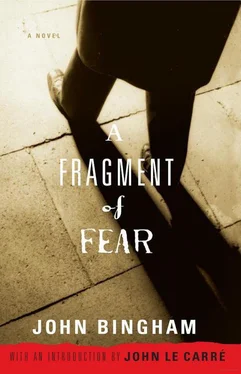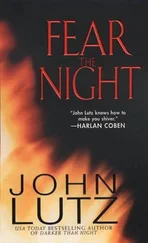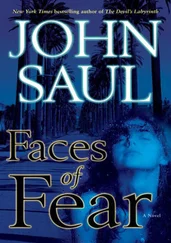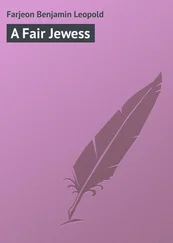John Bingham - A Fragment of Fear
Здесь есть возможность читать онлайн «John Bingham - A Fragment of Fear» весь текст электронной книги совершенно бесплатно (целиком полную версию без сокращений). В некоторых случаях можно слушать аудио, скачать через торрент в формате fb2 и присутствует краткое содержание. Жанр: Триллер, на английском языке. Описание произведения, (предисловие) а так же отзывы посетителей доступны на портале библиотеки ЛибКат.
- Название:A Fragment of Fear
- Автор:
- Жанр:
- Год:неизвестен
- ISBN:нет данных
- Рейтинг книги:3 / 5. Голосов: 1
-
Избранное:Добавить в избранное
- Отзывы:
-
Ваша оценка:
- 60
- 1
- 2
- 3
- 4
- 5
A Fragment of Fear: краткое содержание, описание и аннотация
Предлагаем к чтению аннотацию, описание, краткое содержание или предисловие (зависит от того, что написал сам автор книги «A Fragment of Fear»). Если вы не нашли необходимую информацию о книге — напишите в комментариях, мы постараемся отыскать её.
A Fragment of Fear — читать онлайн бесплатно полную книгу (весь текст) целиком
Ниже представлен текст книги, разбитый по страницам. Система сохранения места последней прочитанной страницы, позволяет с удобством читать онлайн бесплатно книгу «A Fragment of Fear», без необходимости каждый раз заново искать на чём Вы остановились. Поставьте закладку, и сможете в любой момент перейти на страницу, на которой закончили чтение.
Интервал:
Закладка:
John Bingham
A Fragment of Fear
CHAPTER 1
We live in a dangerous age, and this is not only because of the hydrogen bomb and high taxation.
Man has always been stalked by terror, such as medieval plagues, Mongol invasions, racial persecutions, or individual rapacity; and one might add, in passing, that to blame modern juvenile crime waves upon the uncertainty of the times is the finest piece of buck passing since Judas Iscariot’s insignificant act of recognition drew limelight from the power politics of his era.
As in the past, so today, the ordinary citizen must keep his eyes skinned if he is not to go under, a victim either of the dangers he recognises daily, or of other dangers which come upon him suddenly, of which he can have little inkling until, bewildered and off guard, he is called upon to defend himself as best he can.
And a very poor best it can be on occasions.
The world is still a jungle, though the settlements are larger and the linking paths, though they vary, are mostly well made and seem deceptively safe.
By day and even by night, the peasant can normally go about his lawful avocations in safety. Yet now and again, as he struggles along the more difficult trails, he may catch a momentary glimpse of eyes in the undergrowth on either side, and hear soft movements and the snapping of twigs.
If he is an optimist, he will shrug his shoulders and take little notice, as I reacted at first.
But now I say this: the dangers change in some measure but the predators are still there, a little more subtle than in former times, though fundamentally not much-fundamentally, not much-and liable suddenly to be just as red in tooth and claw.
There is no need to take notice of these words.
Better, in some ways, to be an optimist. Better to hope for the best, as the ill-equipped peasant has been compelled to do through the ages, if life was not to become intolerable. And if, now and again, the peasant is clawed to the ground, what of it?
There are plenty more of us.
The first part of this story is simple, as such affairs go. I am a writer of crime stories, which means that the characters in my stories are mostly fictional, but occasionally the victim bears a resemblance to somebody I detest, and why not indeed? Every job has its perks. Notionally to kill one’s current pet aversion is some recompense for the rest of the toil involved.
But I did not really know Lucy Dawson, and I certainly did not detest her.
Yet there she was, a victim served up, as it were, upon a plate, for although I did not know her to speak to, I had seen her several times.
She was a tall, thin woman in her seventies, with a high bridged nose, a gentle smile, and a soft cultured voice. I imagine that in England she mostly wore black, but in deference to the heat of September, south of Naples, she wore grey or pale blue dresses.
I think of her mostly in grey, sitting at a table by herself, dining by herself under the trees in the outdoor restaurant, where the hotel staff served meals during the hot season. Here an occasional lizard will run among the tables, and across the Bay the lights of Naples twinkle in the darkness.
I remember vaguely the glitter of diamond rings on her fingers, and, with more precision, a magnificent amethyst and diamond pendant which she wore on a gold chain about her neck. She wore it by day as well as in the evening, and I recall thinking that it was a bit much for daytime, and that she was doubtless reluctant to leave it in her room.
She rarely spoke to anybody, apart from exchanging the normal civilities in a courteous manner, though I know that at least two married couples, for reasons of social charity, had made conversational approaches.
She spent the four days during which we were both at the hotel either reading newspapers, which she had organised from England, or books, or going for walks along the sea road aided by a brown walking stick with a gold and ivory handle, though I heard later that she sometimes made longer excursions in a hired car.
I then left my hotel near Sorrento for a week, to visit Paestum, Cuma, and other Roman remains. I had some far-fetched idea of setting a murder at Cuma, in the dark underground cavern where Sybyl is supposed to have consulted her prophetic books, or in the sanctum of one of the Greek temples at Paestum, or in the Villa of Mysteries at Pompeii, or some such nonsense.
In my absence, the murder had been committed almost on my doorstep, or at any rate a comparatively few miles away in Pompeii.
I remember thinking that had I not known Pompeii so well from former visits, I might have been wandering around those magnificent ruins on the day she died.
When I returned to my Sorrento hotel, most of the excitement had died down. The police had been and gone. Her room, which for a period had been both sealed and locked, was now only locked, pending disposal of her belongings. The hotel guests and staff had ceased to mull over the tragedy in low voices. People swam and lay in the sun, and watched newcomers with pale skin rubbing themselves with anti-sunburn lotion. The beach umbrellas looked as gay as ever. The boat called each morning for day-trippers to Capri, and Vesuvius brooded mistily in the distance, seemingly content with the havoc he had wrought in A.D. 79.
Already, gentle, lonely Mrs. Dawson, photographed, docketed, and cleaned, was buried in the Protestant cemetery at Naples, and in the hotel it was almost as if this elegant old lady had never been there.
I had naturally read about the crime in the Italian newspapers and was puzzled as the Italian police were.
Her diamond rings and valuable amethyst pendant had not been stolen. About seven pounds’ worth of Italian lire were untouched in her handbag. A sex assault was clearly out of the question.
She had been strangled with an Italian silk scarf behind the walls of House No. 27 in Section 12. She had several rather fine Italian scarves in delicate pastel shades of mingled browns and blues and yellows. I do not know which one was used to kill her.
There are a great many houses in Pompeii which are mere shells, roofless, the ruined walls of varying heights enclosing squares and rectangles of bare earth. I imagined the killer luring this old and frail woman into House No. 27, then leaning forward, perhaps with some pretext of adjusting her scarf, crossing his hands, while each held one side of the scarf, then quickly extending his hands so that the knuckles pressed suddenly into the carotid artery on each side of her neck. The suddenness and shock prevented an outcry. It is a soundless and happily painless method of causing unconsciousness in two or three seconds. Lengthier pressure causes death by continuing to cut off the supply of blood to the brain. Thus I imagined it happening.
If this method had been used, it indicated that Mrs. Dawson knew her murderer, for I could not imagine that dignified Victorian figure allowing a strange man to adjust her scarf, and for reasons of physical strength it would almost certainly have been a man.
But maybe it was a stranger, and maybe a clumsier method had been used. I hoped not.
I drove over to dusty Pompeii, not for ghoulish reasons, but because I write articles as well as books, and if at any time I wished to include this crime, it would be useful to have visited the spot and seen it with one’s own eyes, and taken notes.
The visits of morbid sightseers had ceased, and I entered House No. 27 alone, though twenty yards up the street I saw a swarthy, stocky figure heave himself off a low wall and move in my direction. He was dressed in the simple uniform of the guards whose duty it is to prevent sightseers making off with such remaining Roman treasures as have not been housed in the local museum or removed to the Naples museum.
Читать дальшеИнтервал:
Закладка:
Похожие книги на «A Fragment of Fear»
Представляем Вашему вниманию похожие книги на «A Fragment of Fear» списком для выбора. Мы отобрали схожую по названию и смыслу литературу в надежде предоставить читателям больше вариантов отыскать новые, интересные, ещё непрочитанные произведения.
Обсуждение, отзывы о книге «A Fragment of Fear» и просто собственные мнения читателей. Оставьте ваши комментарии, напишите, что Вы думаете о произведении, его смысле или главных героях. Укажите что конкретно понравилось, а что нет, и почему Вы так считаете.












